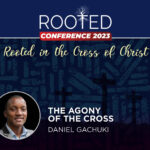“I advise you to keep close to the atonement. The doctrine of the cross is the sun in the solar system of truth.” Every gospel preacher would do well to heed this timeless counsel from John Newton. The atonement refers to the entirety of Jesus’ work of reconciling God and men, by dying as a substitute, and paying the infinite penalty for our sins. Christ died in place of sinners and bore the sins that God justly condemns and punishes. This teaching, that God himself has made full atonement for sinners (1 Peter 2:24), is unique to Christianity.
The atonement is the real heart of the gospel. The lifeblood of the Christian life.
As such, it’s no hyperbole to say that the atonement is the real heart of the gospel—and the lifeblood of the Christian life. A crucified Saviour is what sets Christianity apart from all other world religions. This understanding is apostolic to the core. Even Paul preached as of first importance that “Christ died for our sins, in accordance with the scriptures” (1 Corinthians 15:3). More tellingly, he identifies the gospel as “the message of the cross” (1 Corinthians 1:18). One can scarcely read the Gospels without seeing that this very idea was the orienting reality of Jesus’ life and ministry. He came to “give his life as a ransom for many” (Mark 10:45).
No Greater Theme
Worthwhile preaching doesn’t merely rake leaves across the surface of scripture. Rather, it drills deep to mine out the gold. Such ought to be our preaching of the atonement. We need to preach that the atonement is perfect (Hebrews 7:26-28), efficacious for all those who come to God and believe (John 6:37, 40; Isaiah 53:5). We also ought to preach its various motifs: reconciliation (Romans 5:10-11; 2 Corinthians 5:18-20); redemption (Romans 3:24; Galatians 3:13); propitiation (Romans 3:25; Hebrews 2:17); sacrifice (Ephesians 5:2; Hebrews 9:1-10:18), forgiveness (Ephesians 1:7); and victory (Hebrews 2:14; 1 John 3:8).
Worthwhile preaching drills deep to mine out the gold of scripture.
Those of us who preach are never at risk of being too atonement-centred. In fact, to preach the doctrine of salvation without properly spotlighting the atonement is to preach an emaciated gospel at best and a non-gospel at worst. Paul’s resolve was to “preach Christ and him crucified” (1 Corinthians 2:2). The knowledge of Christ crucified stands perched above all other knowledge. We may also deduce that there can’t be true pastoral ministry apart from the cross.
In light of this apostolic precedence, we too must centre the cross in our preaching and pastoring. If we do, we will benefit ourselves and our hearers in the following five ways:
1. The Atonement Establishes Both Identity and Assurance
Our essential identity as Christians is tied up with Christ’s work on the cross. Martin Luther said that the sweetness of the gospel is found in the first person pronouns: “the Son of God who loved me and gave himself for me” (Galatians 2:20). Jesus did not die for nameless, faceless people. He died for “me.” His cross stands as an eternal monument of God’s holy and infinite love towards believers, like me.
His love is such that “while we were still sinners, Christ died for us” (Romans 5:8)! The cross testifies to the matchless blessedness of every believer. So Paul asks: “He who did not spare his own Son but gave him up for us all, how will he not also with him graciously give us all things?” (Romans 8:32).
Christ’s cross stands as an eternal monument of God’s holy and infinite love towards believers.
That Christ died in our stead also cements our assurance of eternal forgiveness (2 Corinthians 5:15-21; Galatians 3:13). The words of Augustus Toplady ring ever so true: “Payment God cannot twice demand, / First from my bleeding surety’s hand, / And then again from mine.” When we preach the atonement, we not only lead sinners to salvation. For we also help Christians to personalise Christ’s death, resting and rejoicing in it.
2. We Will Be Steadied to Suffer Well
The call to discipleship is explicitly a call to suffering. Jesus clarified that. “If any man will come after me, let him deny himself, and take up his cross, and follow me” (Matthew 16:24). So God encourages believers to endure trials joyfully by “considering Jesus” (Hebrew 12:3; Hebrews 10:32-34). John Flavel’s comments here are peerless: “Take away the knowledge of Christ crucified, and Christians would be the most sad and melancholy beings in the world…let Christ but manifest himself and dart the beams of his light into their souls, it will make them kiss the stake, sing in the flames, and shout in the pangs of death, as men that divide the spoil.”
It is only “when we survey the wondrous cross on which the prince of glory died” that we can reckon “our richest gains but loss.” The scriptural pictures of atonement offer every Christian comfort and hope against sin and suffering through the power of our Lord Jesus Christ.
3. The Atonement Deepens Worship
In many churches across our continent, worship is marked by emotional manipulation, soapy tunes, and superstition. This kind of worship is patently shallow. It is a proven fact that as our theology goes deep, our doxology goes high. True worship is an expression of true adoration rising from a mind that has grasped the depth of profound doctrines like the atonement. It is when our hearts are filled with wonder, that they explode in true worship. The atonement will fuel our worship unto eternity (Revelation 5:9).
When doctrinal understanding is lacking, depth of devotion is also wanting.
Therefore, unless we are well taught in the doctrine of atonement, we will not appreciate the lyrical profundity of some of the songs we sing such as: ‘And Can It Be’, ‘Jesus Paid It All’, or ‘Jesus Keep Me Near The Cross’. If those of us who preach don’t exult in the glories of the cross or expound them, the praises of the cross on our people’s lips will ring hollow. This is because when doctrinal understanding is lacking, depth of devotion is also wanting.
4. Preaching Must Promote Holiness
In most African Traditional Religions, the concept of sin is significantly misleading. Sin is seen as that which violates “the harmony between members in the community or between humans and the Spirit world.” So, fundamentally, sin is not against God. This is why it is hard to make direct connections from ATR concepts of atonement to that of Christianity. In biblical atonement the heinousness of sin and the holiness of God are writ large. It shows that sin is first and foremost a treasonous affront towards God. Preaching the atonement will reveal that the overarching predicament of any African is not poverty, disease, wars, insecurity or witchcraft, as real as these might be, but separation from the true God due to sin. This is the essence of true evangelism.
Ignorance concerning what Christ has accomplished for us will inevitably hamstring our obedience.
Christians in our churches may also become comfortable with sin because they lack understanding of its utter sinfulness. The cross is a clear statement about sin’s gravity and grievousness. Since doctrine is what shapes our lives and strengthens us for holy living, ignorance concerning what Christ has accomplished for us will inevitably hamstring our obedience. Conducting our lives in a manner worthy of the gospel, so Philippians 1:27, assumes a proper understanding of the gospel—especially the atonement (1 Peter 1:13-19).
5. The Atonement Fuels Missions
Many of us have heard the popular narrative about missions: The Moravian Slaves. It is the story concerning two young men of the Moravian Brethren who sold themselves to a slave owner in order that they might preach the gospel to African slaves in the Danish West Indies. It is said that as the ship pulled away from the docks, they called out to their loved ones on shore saying: “May the Lamb that was slain receive the reward of His suffering!”
Since Jesus died to save sinners, Christians ought to do all they can so that sinners hear that message.
At the heart of their heroic missional drive was an understanding of the atonement and its implications. Since Jesus died to save sinners, then Christians ought to do all they can so that sinners can hear the message of salvation. The Scottish Divine, Hugh Martin, argues that “the church flickers in her divine life and becomes shallow in her divine knowledge when she thinks she has ascertained all that is implied in the death of Christ.” This has implications for missions. Understanding the atonement will help us love the Saviour; serve the church he died for; and reach the sinners he died to save.
Could it be that the missional lethargy in most of our churches is a symptom of a deficient understanding of the atonement?
So Much More Could Be Said, So Ensure the Atonement is Heard
In a day when the message of the cross is so often marginalised and its meaning so often undermined, doubling our efforts in proclaiming it could hardly be timelier and more relevant. Those who deny, distort, dismiss, and disparage the biblical doctrine of the atonement do injury to the gospel. Therefore, my brothers, preach the atonement. Preach it powerfully, passionately, and plainly.














